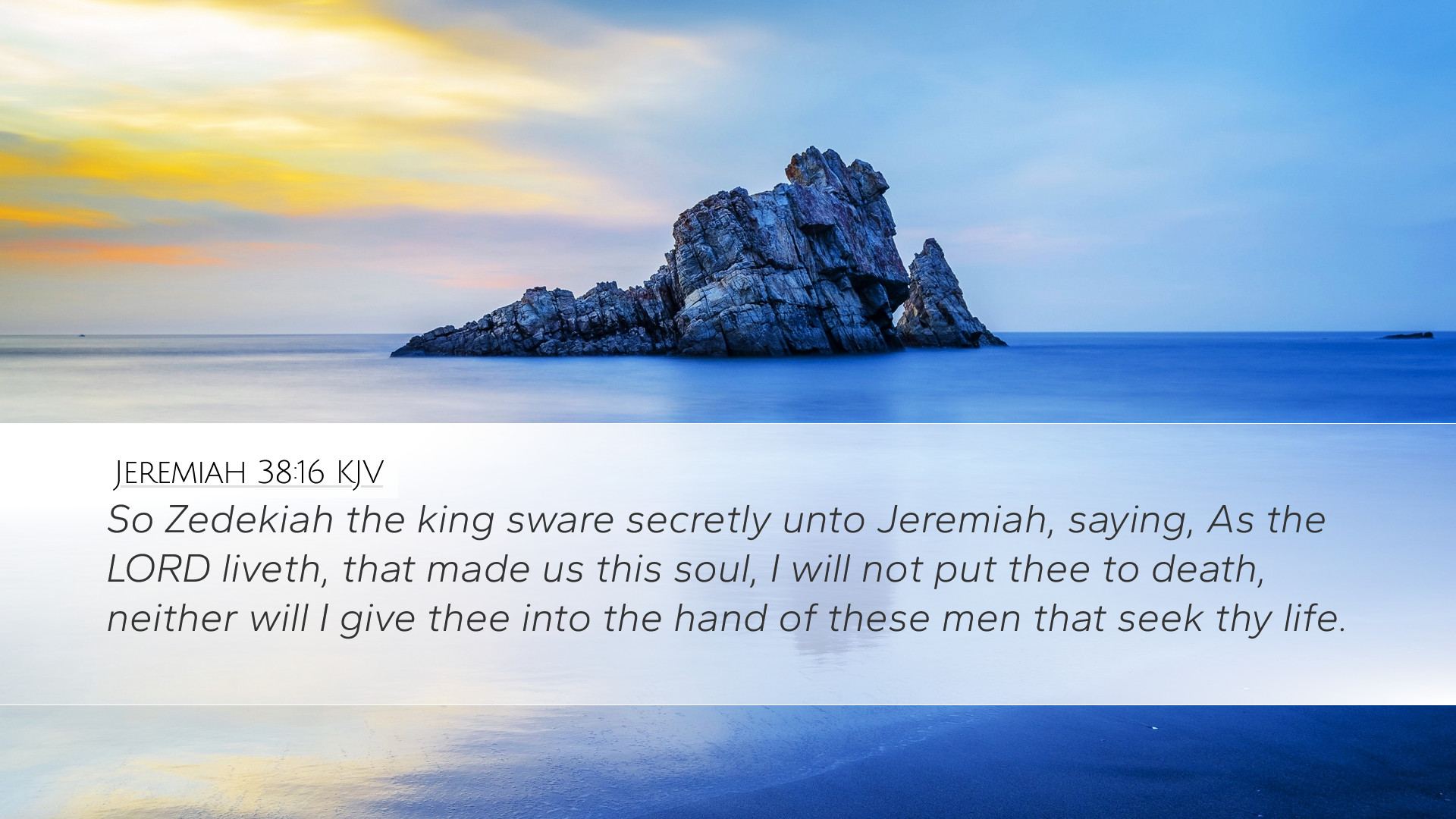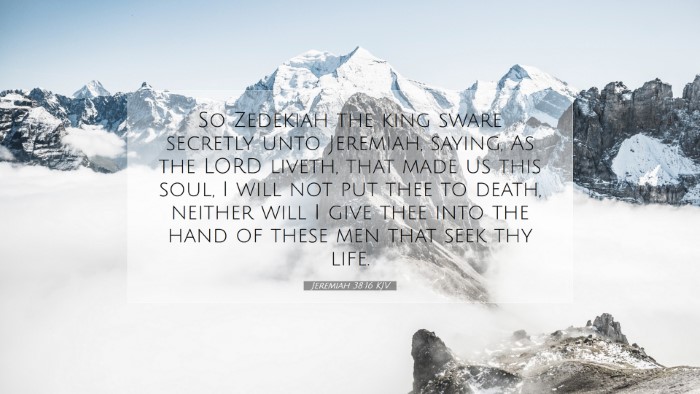Commentary on Jeremiah 38:16
Jeremiah 38:16 states: “So Zedekiah the king swore secretly unto Jeremiah, saying, As the LORD liveth, that made us this soul, I will not put thee to death, neither will I give thee into the hand of these men that seek thy life.”
Contextual Background
The context of Jeremiah 38 is critical for understanding the verse. The prophet Jeremiah found himself in a precarious situation, embroiled in political and prophetic tension during the reign of King Zedekiah of Judah. The backdrop is a time of siege in Jerusalem, where foreign powers threaten the city, and internal dissent is rampant. Zedekiah's reign is marked by weakness and indecision, being heavily influenced by the prophet’s counsel amidst competing political philosophies.
Analysis of the Verse
In this verse, we see Zedekiah making a solemn vow to Jeremiah. This promise is significant in the narrative, indicating a shift in Zedekiah's stance. The king, despite his position of power, exhibits insecurity and desperation, turning to Jeremiah, whose prophetic voice is often met with hostility by the people and other leaders.
Insights from Matthew Henry
Matthew Henry emphasizes the gravity of Zedekiah’s secret oath. He interprets this moment as an indication of the king's moral struggle. Zedekiah swears by the living God, acknowledging the sovereignty of the Lord in the affairs of man. Henry notes that this act of swearing indicates a level of respect and fear of God that Zedekiah, despite his failures, holds in his heart. He contrasts Zedekiah’s willingness to protect Jeremiah with the actions of other rulers who would persecute genuine prophets.
Insights from Albert Barnes
Albert Barnes approaches this verse from the perspective of Zedekiah's political calculations. Barnes argues that Zedekiah's promise to Jeremiah, while initially sincere, may stem from a place of self-preservation. His secret oath can be seen as an attempt to maintain control amidst the chaotic circumstances surrounding him. Barnes highlights that the king's pledge is significant as it demonstrates the conflict between his political ambitions and the prophetic truths spoken by Jeremiah. The fear of the consequences that could come from ignoring Jeremiah’s counsel drives Zedekiah to momentarily align himself with the prophet.
Insights from Adam Clarke
Adam Clarke places emphasis on the implications of Zedekiah's words and actions. Clarke notes that the phrase “as the Lord liveth” marks a serious declaration of intention, signifying a commitment that could have eternal consequences. Zedekiah’s decision to protect Jeremiah speaks volumes about the prophet’s standing and the recognition of God’s power in his messages. Clarke also brings attention to the ‘hand of these men’ who are seeking Jeremiah’s life, illustrating the inherent conflict between prophetic truth and the prevailing societal pressures that often lead to the persecution of God’s messengers.
Theological Reflections
This narrative brings forth several key theological themes. The tension between divine sovereignty and human agency is palpable as Zedekiah grapples with his political role as a king and the prophetic voice of Jeremiah as a servant of God. Furthermore, the verse underscores the ongoing struggle faced by those who uphold the truth in times of crisis.
- Divine Providence: The protection of Jeremiah signifies God's providence over His prophets, ensuring that His message endures despite adversities.
- Human Fear and Responsibility: Zedekiah’s secret oath reflects not only his fear of human opposition but also his struggle with the moral responsibility of leadership under prophetic guidance.
- Faithfulness to God’s Word: The protection of Jeremiah symbolizes a call to faithfulness—even amidst peril—as God's messages may often be countercultural.
Application for Pastors and Theologians
For pastors and theologians, Jeremiah 38:16 serves as a poignant reminder of the importance of standing firm in the face of opposition. It challenges them to consider their roles as shepherds who may also navigate complex political and social landscapes. The passage calls for a commitment to uphold the truth, like Jeremiah, even when it invites conflict or danger.
Moreover, the nuanced character of Zedekiah offers a reflection on leadership: the balance of personal convictions with political realities. It invites church leaders today to engage thoughtfully with societal pressures while remaining true to their convictions.


